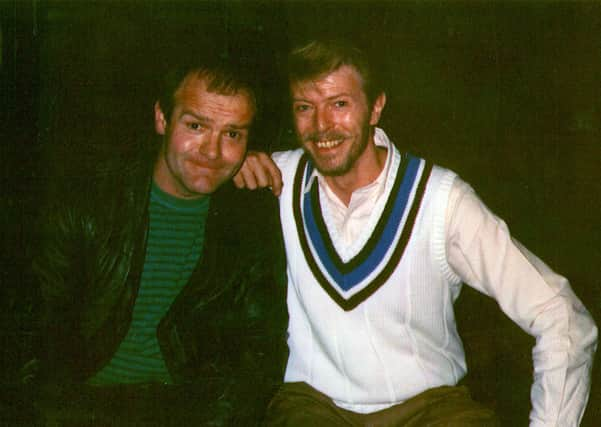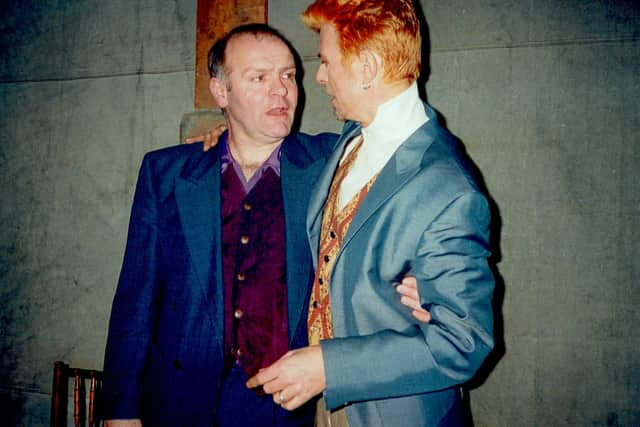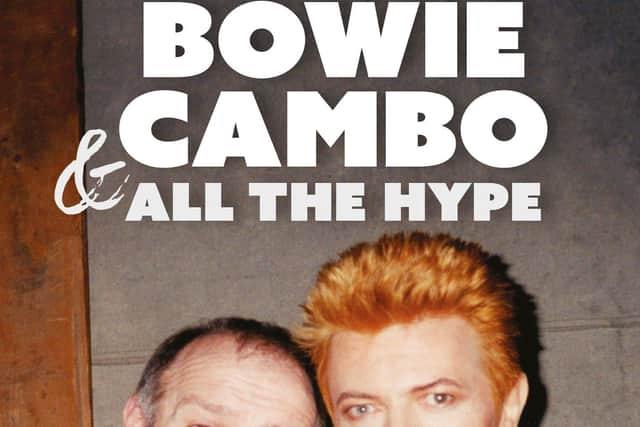John Cambridge: ‘When I met David Bowie I could instantly tell I liked him’


John Cambridge played drums on Bowie’s 1969 album Space Oddity before joining his new band, The Hype, and introducing the singer to guitarist Mick Ronson, who Cambridge had known from their time in the Hull group The Rats. A few weeks later, Cambridge was best man at Bowie’s wedding to Angie Barnett, before being sacked from The Hype and replaced by Woody Woodmansey, from Driffield.
With the further addition of another Yorkshireman, Trevor Bolder, the band would become the Spiders From Mars.
Advertisement
Hide AdAdvertisement
Hide AdNow 72, Cambridge reveals it took “four years of pestering” by Gary Burnett, co-author of Turn and Face The Strange, a stage show about Ronson originally created for Hull’s City of Culture celebrations, for him to finally pen his memoir. “Bored stiff” by lockdown, he began writing up in longhand recollections he’d shared in the show; they in turn triggered further memories.
The book, Bowie, Cambo and All The Hype, traces his journey from drumming on desks as a pupil at St Wilfrid’s Catholic School in Hull through to joining Hull Beat groups such as The Gonx then The Rats, led by Mick Ronson, and finally to London with the group Junior’s Eyes, who backed Bowie on recordings for his second album, later retitled Space Oddity.
When Junior’s Eyes broke up, Bowie invited Cambridge to join him and bass player/producer Tony Visconti in their fledgling rock group The Hype.
On Bowie’s preference for working with Yorkshire musicians, the drummer says: “I feel big-headed when I mention this but if you were doing a family tree and you put the first person from Hull that started this whole cycle off it was me.”
Advertisement
Hide AdAdvertisement
Hide AdBowie’s appreciation of the Yorkshire sense of humour was another bond, Cambridge believes. “When I was with Junior’s Eyes, I knew Mick Wayne (from Hull) but the rest of them I didn’t know. I got on with them all right, but when I met David I could instantly tell I liked him because he’d got a good sense of humour and he was a mate and I think I reflected the same with him.”


Back before he met Bowie, Cambridge had considered forming a band with Robert Palmer, then an up-and-coming singer on the Yorkshire circuit. He recalls: “When I was in The Rats and The Gonx we used to play a ballroom in Beverley and Alan Palmer – as he was called back then – had a band called The Mandrakes. If there waas a second or third band on (the bill) you’d have a chat with them in the bar – that’s how I got to meet Alan and Mick Ronson.”
Ronson was a “very deep” character, he says. “The only time Mick would be outgoing with his personality and get really happy-go-lucky was when he’d had a pint,” he remembers. “He didn’t (normally) drink because he was a Mormon but he’d have a pint of the poor man’s black velvet – half of cider and half of Guinness – and he’d be way over the top. He couldn’t drink more than one because otherwise he’d fall asleep, but apart from that he was just very moody and deep, but a very great guitarist.”
In the end London proved a considerable draw for a Northern musician with ambition. At that point, he says: “Just to have your name in the Melody Maker (in the listings of) where the bands were playing would have been good.”
Advertisement
Hide AdAdvertisement
Hide AdThe invitation to record with Bowie came after Junior’s Eyes frontman Mick Wayne played lead guitar on David Bowie’s 1969 hit Space Oddity and backing band was needed to play on the rest of the songs on the album.


Cambridge remembers Bowie being very straightforward to work with. “We’d have a session at Trident for four hours or something and we’d go in there, set all the gear up and David would sit on a high backless stool and say, ‘Here’s a song’.
“We’d never heard it before so he’d play it a couple of times. Something like Cygnet Committee would last about nine minutes and the other guitarist would watch what chords he was playing and then he’d say, ‘Shall we have a go at it then?’ He’d say, ‘John, can you put a drumbeat to this?’ and you’d have to remember where there was a stop and where there wasn’t. We’d do it a couple of times then he’d shout to Tony Visconti in the console room, ‘Shall we go for a take?’ We’d maybe do one or two then he’d say, ‘That’s it, next’.”
Bowie was clearly impressed by Cambridge and on hearing that Junior’s Eyes was breaking up, he invited him to join The Hype. When it was decided they needed a guitarist, Cambridge recommended Ronson, and was despatched to Hull to track down his old bandmate, who was then working for the city’s parks department.
Advertisement
Hide AdAdvertisement
Hide AdInitially, he says, Ronson “didn’t want to know”, having been “ripped off” while working in London a couple of years previously. But, Cambridge says: “I think what turned Mick’s head around was when I said, ‘I’m doing the last gig of Junior’s Eyes and it’s the first gig of this new band, The Hype, and we’re at the Marquee club’. Mick probably thought it would be worth going down just to go to the Marquee club, so he did and rest is history.”
In February 1970, when Bowie needed his Rover 100 servicing, on Cambridge’s suggestion he and Angie travelled to Hull, staying at the drummer’s parents’ flat in Brisbane Road. In his book, Cambridge remembers them running up a large bill phoning universities to book gigs and smoking all his father’s cigarettes. Nevertheless they got on well. “Maybe my dad reminded him of his dad,” Cambridge reflects today. “They were from ten miles apart (near Doncaster) and probably had the same accent.”
Cambridge believes Bowie even picked up the phrase ‘hunky dory’ from his father, as well as well as the line “look at those cavemen go”. “He was a bit of a magpie, was David,” he says. “He’d hear things and put them up there in his brain and bring them out when he wanted them.”
While in The Hype, Cambridge lived at Haddon Hall, the large Victorian house in Beckenham that the Bowies were renting along with Visconti and his then partner. Cambridge remembers Bowie sitting down cross-legged in the communal living room with a guitar. “He’d just starting writing songs and singing. When he was singing ‘Oh by jingo, after all’ I said said, ‘That sounds good, why don’t you get Angie to sing on it?’ He looked at me and said, ‘Don’t encourage her’.
Advertisement
Hide AdAdvertisement
Hide Ad“I remember him writing The Prettiest Star there. Then they were just songs, but he actually wrote them while I was there.”
The Hype’s show at the Roundhouse, where the band came on in costumes, has been cited as the first glam rock gig. “I’ve still got the cowboy hat and somewhere the waistcoat,” Cambridge says, adding that the hat has been used as a prop in Turn and Face The Strange.
When the Bowies married at Bromley Register Office in April 1970, Cambridge was their best man. He recalls: “Tony Visconti was supposed to do best man but he told David, ‘I’ve got a (recording) session and I can’t do it’. I was going to be a witness but as I say in the book, his mother got up and took my place and David looked round and shrugged his shoulders, It was in conversation afterwards when somebody said, ‘Were you at the wedding?’ and David turned round and said, ‘Yeah, John was the best man’. So I thought, ‘I’ll take that’. There were only maybe two blokes there and I was one of them.”
One detail that Cambridge hopes his book will finally clear up is over his sacking from The Hype. Today he says he doesn’t blame Bowie. “I think it was all planned out when Mick came down, but I didn’t know this at the time,” he says. “I think people can read the book and make their own minds up.”
Advertisement
Hide AdAdvertisement
Hide AdReturning to Hull, Cambridge played with various bands and reunited with another Bowie alumnus, John ‘Hutch’ Hutchinson. Although Ronson later wrote to him, the pair were only really in close contact shortly before the guitarist death, from cancer, in 1993.
Relations with Bowie, however, remained friendlier. The pair met before Bowie’s band Tin Machine played at St George’s Hall, Bradford in 1989 and stayed in touch afterwards. Iman invited Cambridge and his wife to Bowie’s 50th birthday in New York and stayed in touch via email.
Cambridge believes their friendship endured because he never tried to cash in on his association with the singer. “We’ve always been friends and whenever I would go and see him playing after that he would say to ring his assistant Eileen (D’Arcy). He always got back and was pleased to see me. In fact at Hammersmith as I was just going out of the door, he said, ‘Keep in touch, John, keep in touch.’”
To Cambridge’s delight, earlier this year Bowie’s recordings with The Hype were finally collected together on the album The Width of a Circle. “When the Ziggy Stardust thing happened with the Spiders – Woody, Trevor and Mick – you’re thinking, ‘I aspired to do that and it never happened to me but I sort of hand a hand in it’,” he says. “I was playing in a football team and playing darts and working as a plasterer on building sites and Bowie’s going up bigger and bigger. Now all this attention’s come and people have said about me introducing him to Mick Ronson and all this stuff, I didn’t think about that, but it’s nice that people know now.”
Bowie, Cambo and All The Hype is out now, published by McNidder & Grace, £12.99.
Comment Guidelines
National World encourages reader discussion on our stories. User feedback, insights and back-and-forth exchanges add a rich layer of context to reporting. Please review our Community Guidelines before commenting.